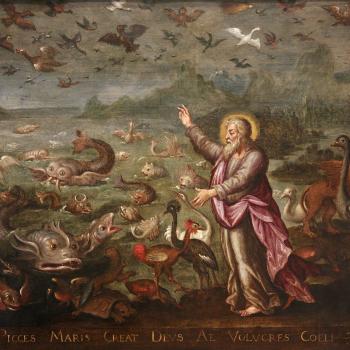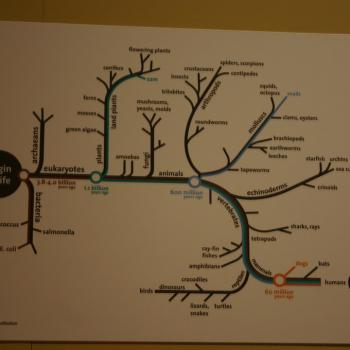![Male Gorilla by Brocken Inaglory (Own work) [CC BY-SA 3.0 (http://creativecommons.org/licenses/by-sa/3.0) or GFDL (http://www.gnu.org/copyleft/fdl.html)], via Wikimedia Commons](https://wp-media.patheos.com/blogs/sites/637/2016/06/Male_gorilla_in_SF_zoo-269x300.jpg)
The Cincinnati Zoo was put in a bad situation, either due to a poorly guarded exhibit, a poorly watched child, or both. To criticize the situation is not to say the right action was not undertaken, but it does question why the situation developed as it did, and when we know that, then we can find who or what is to blame for it. And yes, there should be some blame here. Someone is culpable for the situation. One does not have to be an expert in zoos or parenting in order to know something went wrong and someone is at fault.
Once it is understood who is at fault, and why they are at fault, then we can determine what penalty, if any, should be put in play. We must not ignore that when we are given responsibility, either over children of our own, or over animals, there will be a price to pay when we fail that responsibility. If the zoo is at fault, then the zoo should pay the price as best it can to restore what is lost. If the mother is at fault, we can’t just dismiss her responsibility with some mantra like “boys will be boys” or “children will be children.” If she had not been attentive with her child, and he went somewhere and physically damaged someone else’s car, no one would say she should not pay for the damage done to the car, an inanimate object. How, then, can we simply dismiss responsibility with respect to the death of Harambe if the child’s mother can be shown to be negligent?
Now some would say we should not care because the gorilla was just an animal. Again, would we say the same if it were a car or some other prized inanimate object which was damaged? No? Then when dealing with the life of an animal, especially when it is an animal of an endangered species, we should not just shrug our shoulders and act as if its death is meaningless. To feel sorrow for the death of the gorilla is not to say that the actions of the zoo to save the child is wrong, but it is to note that the gorilla was a creature with value given to him by God. It is not treating the gorilla as a human to say that, just like it is not treating a car as a human to think a mother would be responsible if her child damaged someone else’s vehicle. We should not take lightly that something bad happened, that the death of a gorilla should not have happened, and that it is indeed sad that Harambe had to be killed. We should not ignore the worth of the gorilla, the good which God gave to him by bringing him into existence, by deflection and saying the gorilla is not human, therefore his death matters not.
His death matters because his existence is a good, and his death therefore brings an end to that good. His death should also matter because we have been given stewardship over the earth, and as stewards we must seek to treat the earth and its creatures with dignity and respect. The commentary I’ve seen from many seems to ignore this responsibility we have been given. Those who feel sorrow in the death of Harambe are following through with the sorrow which should happen when we, as a society, fail at our stewardship to the world. Perhaps some have excessive sorrow, but that should not be used to dismiss our responsibility as stewards and the sorrow we should feel for our failure.
Similarly, we should not deflect the proper and just sorrow over Harambe’s death by saying that other deaths should concern us more. This, however, is what I see quite a few doing when they point out that babies are being killed, and people are suffering, therefore, we should not be concerned about the death of an insignificant animal. What surprises me is that people who say this should know better; they have faced similar responses to their interest, to the goods which they promote, where the good they work for is pitted against abortion, and they are told that their work is meaningless so long as babies are being killed. Just as it is wrong to say “what about the babies” as an excuse to ignore poverty concerns, it is also wrong to say “what about the babies” as an excuse to ignore ecological concerns (the earth is our common household and so it needs to be treated with respect). Therefore, as animals should be included in all such ecological concerns, “what about the babies” should not be used as an excuse to ignore our proper and just treatment of animals. This does not mean we are treating animals as equals to humans, but on the other hand, it means we must respect them for the good contained in them and to undermine that is a sin.
We must not end up having one good being used to excuse the neglect of another good. We must rather work to promote all that is good, and show how various goods work together to complement each other instead of oppose each other. Human rights improve if we understand and act as just stewards of the earth, including that of animals; it is a part of our duty to do so. When we feel it is not worthwhile to be concerned about the wellbeing of animals, then the cruelty which is allowed reverberates in us and our relationships with other humans, showing the impact of our carelessness does not just stay with the animals we neglect.
After all, when Balaam hit his ass, and the ass talked back about being mistreated, we must not make Balaam in the right by giving him the ability to excuse himself by saying, “What of the children being abused?” Again, our stewardship over the earth and our treatment of fellow humanity should not be seen as opposed to each other as an either-or, but rather as part of a holistic approach which understands cruelty of any kind should not be justified.
I know many will disagree with me here, but my interest in animals and their rights and our responsibilities to them makes me have to say something.
For other, differing views, on this topic see also from patheos:
Dave Armstrong: Relative Value of Gorillas vs. Humans
Jonathan Ryan: Death of a Gorilla: A Sentimental Holocaust
Rebecca Bratten Weiss: Scapegoating, nature, and narcissism: some thoughts on the cincinnati zoo incident
Stay in touch! Like A Little Bit of Nothing on Facebook:
A Little Bit of Nothing












